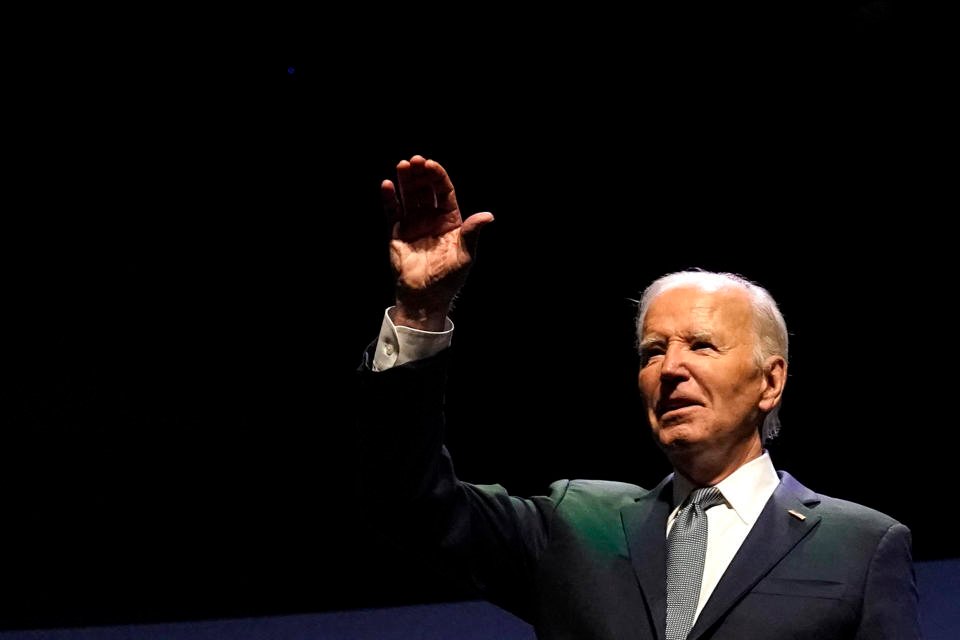President Joe Biden ended his presidential campaign Sunday after a politically disastrous debate performance ignited lingering voter and party concerns about whether the 81-year-old was capable of serving a second term in office.
The president announced his decision in a letter posted to his campaign’s Twitter account. He said he would fulfill his duties as president until his term ends in January and said he would speak to the nation “later this week in more detail about my decision.”
He also endorsed his vice president, Kamala Harris, in a follow-up message. “I want to offer my full support and endorsement for Kamala to be the nominee of our party this year,” he said.
The president is currently in Delaware isolating as he recovers from COVID-19. A letter from his doctor early Sunday said his symptoms had “improved significantly.”
The move came less than four weeks after the debate and was an acknowledgement of political reality after a steady drumbeat of Biden allies pushed the president publicly and privately to leave the race.
Lawmakers like Speaker Emerita Nancy Pelosi led the pressure campaign but she was joined by an array of financial world figures who eventually helped force the president to step aside with the threat of withholding future donations.


Senate Majority Leader Chuck Schumer also reportedly pressed Biden to step aside in recent days. On Sunday, he reacted in a glowing statement toward Biden, saying that while his decision was “not easy,” “he once again put his country, his party, and our future first.”
One of the most prominent donor voices in recent weeks was George Clooney. The actor has helped raise millions for Biden but wrote in a New York Times essay he has witnessed Biden’s decline. The president, he added, isn’t “even the Joe Biden of 2020.”
Yet for weeks, Biden and his allies tried to weather the storm.
As recently as Monday, in an interview with NBC News, Biden insisted nothing had changed and he was staying in the race “because the job’s not finished.”
But then in a BET interview that aired Wednesday, Biden acknowledged that he would consider withdrawing “if I had some medical condition that emerged.” Later Wednesday, the White House announced Biden had tested positive for COVID-19 and he traveled to Delaware to self-isolate.


Over a dozen notable political figures joined the chorus in recent days asking Biden to step aside as the standoff between the President and his party reached a climax.
Rep. Adam Schiff, who is expected to become California’s next senator and is a close ally of Pelosi, told the Los Angeles Times “I have serious concerns about whether the president can defeat Donald Trump in November.”
Sen. Jon Tester, who is locked in a tight re-election campaign in his home state of Montana, also called on Biden to step aside on Thursday. Influential Sen. Sherrod Brown of Ohio and many others followed with their own calls on Friday.
An uncertain political path ahead — and one that could rattle markets
The president’s move immediately puts the 2024 election into historic territory. Vice President Harris is the clear frontrunner with Biden’s endorsement, but others could jockey to replace the president as the party’s standard bearer with Biden’s delegates now released.
Political and financial observers began making lists of potential replacements almost immediately after Biden’s meandering debate performance saw him lose his train of thought on the debate stage and meander from topic to topic in a way that crystallized months of growing voter concerns about his fitness for office.
Other figures viewed as potential candidates are prominent Democratic governors like Josh Shapiro of Pennsylvania, Gretchen Whitmer of Michigan, and Gavin Newsom of California.
“If there is another candidate, can that candidate make it a conversation about Trump and a conversation about how unfavorable he has been?” asked Raymond James Washington policy analyst and managing director Ed Mills in a Yahoo Finance Live appearance Friday as the pressure neared a crescendo.
It’s a process that all sides expect will be messy and fast-moving, with the potential to rattle markets and the political world in the weeks ahead.
A selection process may need to begin immediately — perhaps even before the Democratic National Convention kicks off in Chicago on Aug. 19. That’s because of a new law in Ohio that requires political parties to certify the presidential ticket by Aug. 7.
Then, whoever Democrats select will have to quickly take up Biden’s mantle and face off against former President Donald Trump in an election that begins in September when early voting gets underway and continues through election day on November 5.
They will also face a difficult fundraising task after a flurry of donations to Trump in recent months saw the Republican erase an early lead for Democrats in the money race.
Biden’s replacement will also have to quickly formulate her or his own case on economic issues.
The new candidate will face a challenge in taking up Biden’s mantle on the economy and formulating a message to sway voters fixated on issues like a 20% rise in prices since Biden took office.
At the recent Republican National Convention in Milwaukee, Republicans again hammered Biden and the Democrats incessantly over inflation.
Monday night at the convention was focused on the theme “make America wealthy once again” with speaker after speaker highlighting prices in the grocery store and at the gas pump.
This post has been updated with additional context.
Ben Werschkul is Washington correspondent for Yahoo Finance.
Click here for politics news related to business and money
Read the latest financial and business news from Yahoo Finance

